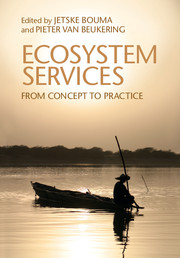Book contents
- Frontmatter
- Contents
- About the authors
- Part I Introduction
- Part II Measuring ecosystem services
- Part III Valuing ecosystem services
- Part IV Paying for ecosystem services
- Part V Governing ecosystem services
- 10 Global governance of ecosystem services and related policy instruments
- 11 Public–private partnerships and the governance of ecosystem services
- 12 Local governance of ecosystems and community co-management
- Index
- Plate section
- References
11 - Public–private partnerships and the governance of ecosystem services
from Part V - Governing ecosystem services
Published online by Cambridge University Press: 05 February 2015
- Frontmatter
- Contents
- About the authors
- Part I Introduction
- Part II Measuring ecosystem services
- Part III Valuing ecosystem services
- Part IV Paying for ecosystem services
- Part V Governing ecosystem services
- 10 Global governance of ecosystem services and related policy instruments
- 11 Public–private partnerships and the governance of ecosystem services
- 12 Local governance of ecosystems and community co-management
- Index
- Plate section
- References
Summary
Introduction
After the previous chapters surveyed a wide array of policy instruments for governing ecosystem services at the global level, this chapter scrutinizes one specific approach to governing ecosystem services, public–private partnerships (PPPs) for sustainable development. PPPs have become a highly visible and much discussed element of global sustainability governance. Especially since the 2002 Johannesburg World Summit on Sustainable Development (WSSD), transnational PPPs have multiplied, now counting well above 300 partnerships in the register maintained by the United Nations Commission on Sustainable Development. In policy and academic debates alike, partnerships are promoted as a solution to deadlocked intergovernmental negotiations, to ineffective treaties and overly bureaucratic international organizations, to power-based state policies, corrupt elites, and many other real or perceived current problems of global governance. However, systematic evidence of the impacts of PPPs is scarce and the broader consequences of outsourcing and privatizing environmental governance are not well understood. This chapter draws on a multi-year research project on the emergence and effectiveness of PPPs for sustainable development that utilizes a large-N database to understand the role and relevance of PPPs in contemporary global environmental governance.
In addition to providing a general assessment of partnerships, this chapter also presents an analysis of the subset of partnerships most closely related to governing ecosystem services.
- Type
- Chapter
- Information
- Ecosystem ServicesFrom Concept to Practice, pp. 230 - 249Publisher: Cambridge University PressPrint publication year: 2015
References
- 2
- Cited by



